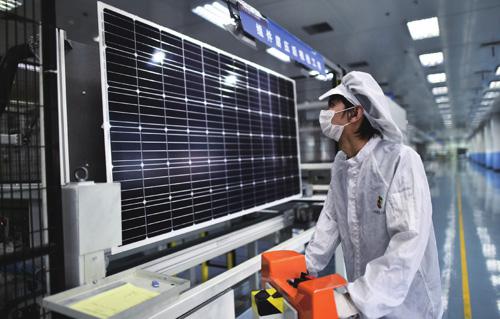From Speed to Quality
2018-04-08
The Report on the Work of the Government delivered by Premier Li Keqiang underlines the importance of highquality growth, reform and opening up and people-centered development. Hu Angang, Director of the Center for China Studies at Tsinghua University in Beijing, shared his views on these issues during an interview with Beijing Review reporter Deng Yaqing.
After experiencing an extended period of rapid growth, Chinas economy has sailed into a new phase in its development, one leading toward sustained prosperity. Since entering the “new normal,” the country has been undergoing a transition from high-speed to high-quality growth, from a medium-high to a high level of income, and from swift to shared prosperity, signifying that socialism with Chinese characteristics has entered a new era.
According to the Report on the Work of the Government delivered by Premier Li at the First Session of the 13th National Peoples Congress on March 5, China aims to maintain GDP growth of around 6.5 percent this year, achieve a 3-percent CPI rise, create 11 million new jobs in urban areas, contain surveyed and registered urban unemployment rates within 5.5 percent and 4.5 percent respectively, and ensure that residential incomes increase at the same pace as economic growth.
These goals not only align with the goal to build a moderately prosperous society in all respects by 2020, but also suit Chinas contemporary economic reality in its ongoing shift from speed to quality.
Last year China was successful in its efforts to maintain economic stabilization while continuing to register growth. This year marks the 40th anniversary of the implementation of the reform and opening-up strategy, and follows the momentous 19th National Congress of the Communist Party of China. It is also a critical year to realize the countrys development goals for 2020 and carry out the 13th Five-Year Plan (2016-20). Given this, China should push forward economic progress comprehensively and with a practical approach in order to achieve growth characterized by more robust in-novation, more coordinated development, a more beautiful ecological environment and more extensive opening up, with a fairer distribution of the benefi ts this brings.
At fi rst, the role of innovation should be amplifi ed to fuel the sustained improvement in the quality of development. Innovation capacity is a major driving factor for highquality development, and accelerating the implementation of the innovation-driven development strategy will further uplift labor productivity, total factor productivity and potential growth rates.
In order to allow innovation to play a leading role in revitalizing the real economy this year, efforts will be made to carry out the development plan for emerging industries of strategic importance and to speed up the expansion of emerging industries so that these new engines can unleash more impetus in turn. The upgrading of traditional industries will be accelerated by developing an advanced manufacturing industry, while the modern service industry will be stimulated along with the construction of infrastructure including water conservancy, railways and roads, water transport, pipelines, power grids, information transmission and logistics.
A new mechanism should be established to coordinate economic development in a more effective way. To achieve such coordination, emphasis should be placed on addressing imbalances in the course of highquality development. This year China should further advance economic restructuring and release the growth potential of services and green consumption to balance the makeup of the economy, coordinate the development of different regions to rationalize the regional development pattern and facilitate the construction of characteristic towns and a beautiful countryside to promote the integrated development of urban and rural areas.
Importance should also be attached to green development and the construction of an ecological civilization. Green development aims to establish and maintain a harmonious relationship between man and nature. It is imperative to improve the quality of the environment this year. This can be achieved through the acceleration of reforms focused on ecological progress, further improvements in the main functional region system, advancement of the energy production and consumption revolution by creating a clean, low-carbon, safe and effi cient energy system, and expediting the creation of low-carbon pilot schemes. The country must also participate in international cooperation on tackling climate change, by contributing to global environmental governance.
Beyond this, endeavors will be made to open wider to the outside world and to secure new advantages through international cooperation. Open development is the only course for China to build economic strength and national power, which can mobilize resources at home and abroad to advance high-quality development.
In 2018, China needs to push forward economic liberalization by consolidating theories on openness and developing related systems and mechanisms. In the coming years, authorities should relax control over market access in an orderly way, implement the management of pre-establishment national treatment plus negative list, refine laws and regulations related to investment, and strengthen the protection of intellectual property rights. Efforts should also be made to continue to attract foreign investment by improving the countrys business environment and expanding non-financial foreign direct investment. The country should be committed to the healthy development of foreign investment and gradually forming a trade, investment and financing, production and service network geared toward the global market.
Economic development should be more balanced, so that all the people can share its results, as the ultimate goal of development is to enhance the well-being of the people. As China works toward this goal, focus must be placed on the most pressing and immediate issues that are of the greatest concern to its people. This year, related departments should give their attention to the level and quality of public services, especially in sectors such as education, employment, income, social security, healthcare and provisions for the elderly, keep up with the peoples aspirations for a better life, and ensure that people from every level of society can share the benefi ts of reform and development together.
